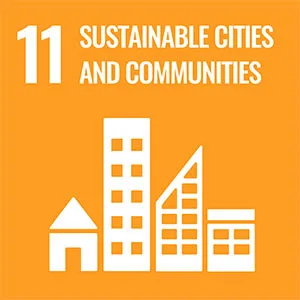MSc Civil and Architectural Engineering
The master's programme in Civil and Architectural Engineering prepares graduates who will design and build our future homes and infrastructure, with a deep understanding of human conditions and needs, as well as urgent demands for sustainability. With two specialisations, students can explore either techniques for design, construction and maintenance of infrastructure or engineering design of buildings, with focus on performance and lifecycle perspective.

Civil and Architectural Engineering at KTH
This master's programme gives you advanced knowledge in the field of Structural Engineering as well as in Civil or Architectural Engineering subjects. You learn how to implement this knowledge by comprehensively understanding buildings and infrastructure as advanced technical systems. The programme offers advanced-level courses that often involve real-life projects and the use of state-of-the-art design and modelling tools.
The programme offers two main tracks: Civil Engineering and Architectural Engineering. The Civil Engineering track is devoted to techniques for designing, constructing and maintaining roads, streets, railway tracks, bridges and tunnels. The Architectural Engineering track focuses on engineering design and analysis of buildings with an emphasis on system-level performance from a lifecycle perspective. The teaching methods comprise a mix of lectures, exercises, projects and laboratory work. During the programme, students engage with industry in various ways, including project work in collaboration with industry experts and the participation of industry experts as teachers.
The programme concludes with a degree project that addresses a specific issue in the field, emphasising investigation and analysis of a problem. The project is an opportunity for you to interact with both industry and current research.
Graduates from the programme will have gained:
- A strong ability to develop and design buildings and infrastructure considering human conditions and needs, as well as society's objectives for economically, socially, and ecologically sustainable development.
- A solid capability to communicate verbally and in writing with different audiences, including discussing and promoting results and findings. We achieve this by having oral and written presentations throughout the entire programme.
- Awareness of societal and ethical aspects, including economic and social issues and ecologically sustainable development.
This is a two-year programme, 120 ECTS credits, in English. Graduates will be awarded a Master of Science degree. The programme is given at the KTH Campus in Stockholm by the School of Architecture and Built Environment (at KTH).
Courses in the programme
The programme courses cover topics such as the design and construction of roads, streets, railway tracks, bridges, and tunnels, foundation engineering, geotechnical engineering, hydraulic engineering, structural engineering, concrete structures, steel and timber structures, building materials, indoor climate and energy, and environmental aspects of the built environment.
Courses in the programme Civil and Architectural Engineering
Future and career
The building sector has a long-term impact on the built environment, and the master's programme in Civil and Architectural Engineering meets a well-known need for engineers who possess the knowledge and skills to design and build infrastructure, residential housing and workplaces using optimal technology in terms of economy and environmental impact. The programme equips graduates with the globally required skills and excellent future career possibilities in research and industry, nationally and internationally.
Graduates from the programme can pursue a professional career designing buildings and infrastructure such as roads, railways, tunnels and bridges. Graduates often work as designers or project leaders in the construction industry, at consultancy firms, for municipalities or public authorities such as the road or rail administration. You can expect to take on roles such as constructor, designer, project developer, structural engineer, VVS and energy system, production engineer, project manager, design manager or researcher. Graduates from the programme work at companies and organisations such as Skanska, NCC, AFRY, PEAB, JM, Veidekke, Svevia, WSP and Trafikverket (Swedish Transport Administration). Furthermore, graduates can pursue academic research careers and doctoral studies. As a result of our cooperation with the industry, particularly during the master's degree project work and other projects, students have the opportunity to meet people from the industry first-hand, which often leads to job opportunities.
Sustainable development
Graduates from KTH have the knowledge and tools for moving society in a more sustainable direction, as sustainable development is an integral part of all programmes. The three key sustainable development goals addressed by the master's programme in Civil and Architectural Engineering are:



Students work on developing and designing buildings and infrastructure with regard to human conditions and needs, and society's objectives for economically, socially and ecologically sustainable development. Some examples are the use of energy from wastewater to heat houses, the development and usage of vacuum insulation panels for isolation of houses, and planning the construction process where we consider all technical, environmental, economic, social and aesthetic aspects.
Faculty and research
The Department of Civil and Architectural Engineering at KTH provides engineering research and education in building and infrastructure engineering. The department's vision is to enable greener, smarter and more economical building and transportation infrastructure through education and the development and application of innovative new scientific knowledge using a systems perspective. All the courses in the master's programme are given by highly qualified teachers and researchers involved in different research projects.
Research within Civil and Architectural Engineering covers a wide range of subjects related to the built environment. It comprises the most common construction materials (concrete, steel, and timber), sustainable buildings focusing on building system design and performance, and civil engineering subjects (soil and rock mechanics, structural engineering and bridges, highway engineering, and transport planning).
Main research topics:
- Building Materials
- Concrete Structures
- Constructional Engineering and Design
- Soil and Rock mechanics
- Structural Engineering and Bridges
- Sustainable Buildings
- Transport Planning







